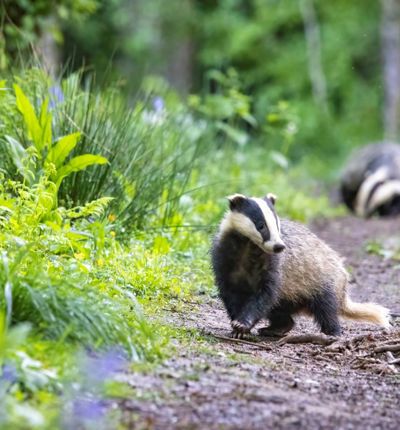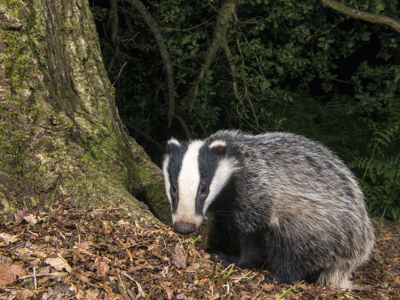
Northern Ireland badger cull by shooting ruled unlawful in High Court
A decision to allow a cull of badgers in Northern Ireland by shooting has been ruled unlawful in the High Court.
Posted on 25 October 2023
In a judgment handed down in Belfast this morning, Wednesday 25 October 2023, it was ruled that the 2021 consultation into the decision to allow the cull of up to 4,000 badgers a year was so fundamentally flawed as to be unlawful. Therefore, the resulting decision to control the spread of bovine tuberculosis (bTB) by allowing farmer-led groups to shoot free-roaming badgers with rifles was also unlawful and the policy has been quashed.
Now the Department for Agriculture, Environment and Rural Affairs (DAERA) will have to rethink the policy following the former Minister’s decision in March 2022 to allow farmers to use rifles to kill badgers to tackle bTB. It will have to hold a new consultation on its options for tackling bTB.
The legal challenge to DAERA was brought by Wild Justice and Northern Ireland Badger Group (NIBG) who are represented by the environment team at law firm Leigh Day. Additional witness evidence was provided by the Born Free Foundation.
The Judge, Mr Justice Scoffield, agreed with Wild Justice and NIBG that the consultation did not meet the requirements for a lawful consultation.
He said DAERA failed to comply with the requirements of a fair and lawful consultation by failing to provide consultees with sufficient information about the basis for its proposed decision to permit them to engage meaningfully with the Department’s thinking.
He said the Minister ought to have been advised, but was not, of why those who responded to the consultation believed a cull by shooting was an inhumane option which would give rise to unnecessary suffering.
The 2021 consultation document repeatedly referred to a “business case” as being the basis for DAERA’s recommendations and decisions. DAERA singled out Option 8 – the culling by shooting of free-roaming badgers by farmer-led companies – as its preferred option and asked consultees if they agreed. But without the business case, Wild Justice and NIBG say it could not understand how that option had been chosen or properly respond to Option 8.
Wild Justice and NIBG argued that because they didn’t have the business case, they couldn’t meaningfully engage with the consultation process and as such the process and the resulting decision were ineffective and unlawful.
They also argued that the Minister failed to properly consider the responses they were able to make. For example, their views on the humaneness of the options available does not appear to have been factored into the decision-making process. The possibility that informed consultation responses could have affected the outcome is clear because when the options were scored, the most humane option (Test, Vaccinate and Remove (TVR)) scored only 10 per cent lower than the least humane option chosen (a non-selective cull).
The judge said consultees were entitled to further information about the analysis behind the Department’s preference for Option 8 including the non-monetary criteria used and how the options were ranked on both cost and risk, with some indication given of why the options were so ranked.
He added that the consultation document effectively skated over DAERA’s reasoning on the scientific issues in a way which did not permit meaningful engagement from expert consultees.
Wild Justice said:
“We are obviously thrilled that DAERA’s policy to allow a non-selective cull of badgers by farmer-led groups has been quashed and that our legal arguments have been upheld with such convincing authority by Mr Justice Scoffield. We are mindful that DAERA may try again to implement a similar policy and we stand ready to challenge any proposal that fails to comply with due consideration of not just public law, but also of the scientific evidence and welfare aspects associated with such action. We are grateful to our partners at the NIBG and the Born Free Foundation for their expertise, to our brilliant legal team at Leigh Day, Matrix Chambers and Phoenix Law for their dedication, and especially to our supporters whose generous response to our crowd funder enabled us to take this case”.
Mike Rendle of NIBG said:
“Today’s judgement has vindicated our very grave concerns about the way the bovine TB strategy consultation was conducted and the decision to implement a farmer-led cull which would inflict immense suffering on great numbers of healthy badgers. The scientific evidence clearly shows that cattle, not badgers, are driving bovine TB in Northern Ireland. Badger culling is not only cruel and ineffective, it is a costly distraction that has no benefit for cattle, farmers or badgers.”
Dr Mark Jones of the Born Free Foundation said:
“Born Free is delighted that Northern Ireland’s High Court of Justice has upheld the Wild Justice and the Northern Ireland Badger Group's challenge to DAERA’s proposals to introduce mass badger culling in Northern Ireland. DAERA’s refusal to disclose the full details of its Business Case during the consultation process on its policy made it impossible for consultees to scrutinise the financial and other arguments it had in mind. The introduction of an England-style badger cull in Northern Ireland, when the latest peer-reviewed science from England clearly demonstrates the failure of this approach to reduce bovine TB in cattle, has no basis in evidence, and would result in the unnecessary and inhumane killing of thousands of perfectly healthy badgers. DAERA should now permanently abandon any such plans and focus instead on the cattle-based measures required to bring bovine TB, which has such devastating impacts for farmers and their cattle, under control.”
Wild Justice and NIBG are represented by Carol Day and Ricardo Gama at Leigh Day, with Phoenix Law as agents in Northern Ireland.
Leigh Day environmental law specialist, solicitor Carol Day said:
“Our clients are delighted that the Judge has held this consultation to be so unfair as to have been unlawful. The failure to provide consultees with the Business Case, which formed the basis for the Minister’s decision to proceed with the controlled shooting of free-roaming badgers, prevented them from engaging meaningfully in the process. The judge also held that the Minister failed to conscientiously consider key points made when making his decision, such as the relative “humaneness” of the various options for addressing bovine TB, on which our clients made specific submissions.”
Counsel instructed were David Wolfe KC and Blinne Ní Ghrálaigh KC, both of Matrix Chambers.




